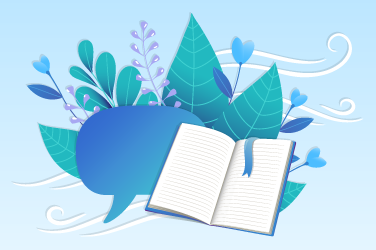I’m a language lover, so reading and writing are my favourite activities. Reading something good is like having an intimate and pleasant talk with a friend. Writing, on the other hand, is a conversation between our physical self and our mind. But as much as I love language, the first time I realized its charm was after I started to use English, my second language, in my everyday life and at work.
Taking language for granted
Language is like air: it’s indispensable to all living creatures, including human beings, yet it could be the last thing that ever comes to our attention. When we speak in our first language in an informal setting, such as at home or with friends, words seem to have their own volition, coming out as naturally as breath. In our countless daily activities, we seldom use language in service of a specific goal or reflect on how we use it, just as we rarely consider breathing techniques unless we’re doing something that incorporates breathing properly. Because language is considered essential just to carry out our routine, we lose the opportunity to observe it objectively. Consequently, we’re deprived of the chance to discover its charm.
The charm of language is like a seed that sprouts when we tend to it with curiosity and attention. If I were a native English speaker, I wouldn’t be exposed to its charm. I was a lawyer in China, and because of my love for language, I’m eloquent and a skilled writer. Both I and the people who know me would rate my Chinese as excellent. Before I settled in Canada, even when I wrote legal documents, I hardly ever grappled with words. The Chinese language was hardly a blip on my radar, let alone a matter of curiosity or something to be given any special attention.
Becoming a student and teacher
After I moved to Canada, improving my English became my main interest. I seized every opportunity to work on my English. One strategy I adopted was to work in sectors, such as interpretation, where the correct and accurate use of language is crucial. One of the jobs I took on was teaching schoolchildren Chinese. Though the school used Chinese textbooks, most of the students could barely understand Chinese. Therefore, I had to rely on English to teach Chinese.
After I taught a couple of classes, it dawned on me that my Chinese wasn’t as good as I had thought. There were quite a few basics of the Chinese language that I needed to review. Chinese has many homonyms but only four tones, so the mispronunciation of a character may cause a communication failure. On that point, I noticed that my tones for some characters were incorrect due to the influence of my dialect. The order of the strokes when writing Chinese characters, another basic element that I had long forgotten, is quite helpful to students. It helps them to grasp the structure of the characters and leads them down a path towards mastering Chinese characters, the foundation of written Chinese. As a result, I began to pay attention to some basic Chinese language elements that I had long ignored. My native language radiated its charm when I was trying to improve my English through teaching Chinese. I ended up improving both my English and my Chinese. Every step forward in my English language learning reveals something amazing to me, whether relevant or irrelevant to language.
The more I learned, the more I saw what needs to be learned. The unlimited room for improvement in language opens my eyes and mind and guides me to look at the world through a new lens. I used to think language was simply a tool for communication, but now I know that it’s far more than that. We are what we say and think. The charm of language resides in its power of transformation.

